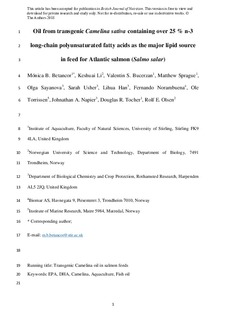Oil from transgenic Camelina sativa containing over 25 % n-3 long-chain PUFA as the major lipid source in feed for Atlantic salmon (Salmo salar)
Betancor, Mónica B.; Li, Keshuai; Bucerzan, Valentin S.; Sprague, Matthew; Sayanova, Olga; Usher, Sarah; Han, Lihua; Norambuena, Fernando; Torrissen, Ole; Napier, Johnathan A.; Tocher, Douglas R.; Olsen, Rolf Erik
Journal article, Peer reviewed
Accepted version
Permanent lenke
http://hdl.handle.net/11250/2587530Utgivelsesdato
2018Metadata
Vis full innførselSamlinger
- Institutt for biologi [2596]
- Publikasjoner fra CRIStin - NTNU [38289]
Sammendrag
Facing a bottleneck in the growth of aquaculture, and a gap in the supply and demand of the highly beneficial n-3 long-chain PUFA (LC-PUFA), sustainable alternatives to traditional marine-based feeds are required. Therefore, in the present trial, a novel oil obtained from a genetically engineered oilseed crop, Camelina sativa, that supplied over 25 % n-3 LC-PUFA was tested as a sole dietary-added lipid source in Atlantic salmon (Salmo salar) feed. Three groups of fish were fed three experimental diets for 12 weeks with the same basal composition and containing 20 % added oil supplied by either a blend of fish oil and rapeseed oil (1:3) (COM) reflecting current commercial formulations, wild-type Camelina oil (WCO) or the novel transgenic Camelina oil (TCO). There were no negative effects on the growth, survival rate or health of the fish. The whole fish and flesh n-3 LC-PUFA levels were highest in fish fed TCO, with levels more than 2-fold higher compared with those of fish fed the COM and WCO diets, respectively. Diet TCO had no negative impacts on the evaluated immune and physiological parameters of head kidney monocytes. The transcriptomic responses of liver and mid-intestine showed only mild effects on metabolism genes. Overall, the results clearly indicated that the oil from transgenic Camelina was highly efficient in supplying n-3 LC-PUFA providing levels double that obtained with a current commercial standard, and similar to those a decade ago before substantial dietary fishmeal and oil replacement.
